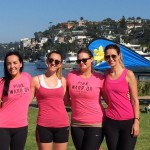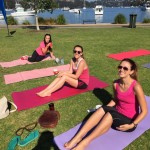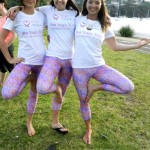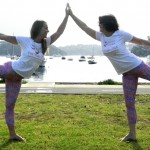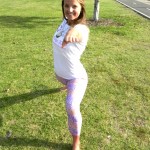Team VIVA! turns pink to raise funds for women’s cancer research – November 12, 2014
On October 26, 2014 Adore Yoga, a local yoga studio in Mosman near VIVA! Communications’ office, organised a very special yoga class to raise money for women’s cancer research.
VIVA! donated to the cause and supported Adore Yoga’s second Pink Yoga event with a team in pink. The region’s largest yoga class saw Team VIVA! and approximately 150 Sydney-siders of all ages enjoy a two-hour yoga and meditation class.
The event was organised by yoga therapist and mother-of-two, Nikola Ellis, who led the sunny Sunday class, raising approximately $5,500 for Cancer Council NSW.
“It was just spectacular. The weather was beautiful and everyone turned up in their finest pink,” Ms Ellis said.
“Everyone came with such open hearts and the atmosphere was great.
“Thank you to everyone for making Pink Yoga 2014 such a special day,” said Ms Ellis.
Breast cancer is the most common cancer in women, with 14,181 Australian female cases diagnosed in 2010.1
This year, experts estimated 15,270 Australian women would be diagnosed with breast cancer1 which translates into approximately 42 Australian women each day receiving a breast cancer diagnosis. Notably, breast cancer is the second leading cause of cancer-related deaths among Australian women, accounting for the passing of 2,914 women in 2011.2,3,4
Sadly, for 2015 and 2016 the numbers of women contracting breast cancer are predicted to increase to 15,600 and 15,930 cases per year.1
Between 5-10 per cent of breast cancer cases are believed to occur due to a strong family history or a genetic mutation. Yet, a woman’s risk of breast cancer increases with age, with the majority of women being diagnosed between 50 and 69 years of age.2
Little is known about the causes of breast cancer and why Australian cases are dramatically and steadily increasing. According to Cancer Council Australia, other risk factors that may predispose women to breast cancer may include: 4,5
- inheritance of mutations in the genes
- exposure to female hormones (natural and administered)
- obesity (poor diet and inadequate exercise) and
- excess alcohol consumption.
This reinforces the need for breast cancer research and awareness. International initiatives, including the Know Your Lemons campaign, aim to increase awareness of, and support women in the detection of breast cancer.
The campaign urges women to ‘get to know your lemons’ and to understand what breast cancer ‘looks and feels like’. If you find any changes, like a little bump or skin erosion, head straight to your doctor.
References
- Australian Institute of Health and Welfare 2012. Cancer incidence projections: Australia, 2011 to 2020. Cancer Series no. 66. Cat. No. CAN 62. Canberra: AIHW.
- Breast Cancer Network Australia. About Breast Cancer. http://www.bcna.org.au/about-breast-cancer [last accessed November 6, 2014].
- Australian Cancer Incidence and Mortality (ACIM) Books – Breast cancer for Australia (ICD10 C50). http://www.aihw.gov.au/acim-books/ [last accessed November 6, 2014].
- Cancer Council Australia. Breast Cancer. http://www.cancer.org.au/about-cancer/types-of-cancer/breast-cancer.html [last accessed November 6, 2014].
- Know Your Lemons Awareness Campaign. http://knowyourlemons.com/ [last accessed November 6, 2014].

